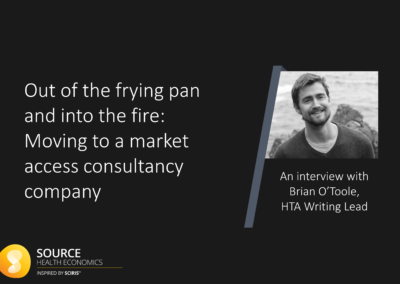Written by Mark Pennington, Consultant Health Economist
With the UK’s National Health Service (NHS) facing an unprecedented patient demand for healthcare, there is increasing interest in artificial intelligence (AI) and how it can support healthcare diagnoses. It is hoped that the integration of AI into triaging processes will alleviate diagnostic pressure by directing patients at the first point of contact, and thereby release healthcare professional (HCP) time.
Like many others, Source Health Economics (Source) is eager to understand the cost-saving potential of AI in the healthcare setting. We have recently provided the economic analysis to evaluate the impact of one such AI-enabled triage platform on healthcare costs. This platform has since been deployed to complement existing technology for NHS patients accessing urgent care.
An AI-enabled triage platform can elicit information from patients on their symptoms, facilitate upload of images, and ask a series of questions and confirming prompts. From this information, the platform can assess the urgency of patient symptoms and provide differential diagnoses for HCPs to review and action.
To understand the cost savings associated with AI-enabled triage, we first determined the sensitivity and specificity of the current NHS 111 system. The performance of NHS 111 was estimated using published data on the proportion of patients presenting at A&E following advice from NHS 111 regarding whether and where to seek care, and an assessment of whether those who attended A&E needed to be there. This analysis demonstrated the potential for a complementary AI element to the existing process, which could improve both the sensitivity and specificity of the current pathway. Improvements in specificity translated into cost savings with respect to ambulance call-outs and A&E visits.
The analysis highlighted the potential for the current pathway to be complemented by an AI model, evidenced by lower costs through reduced unnecessary A&E admissions and ambulance deployments. Additional patient benefits of AI-triage are anticipated through improved sensitivity, and lower demands on ambulance and A&E services; leading to reduced wait times.
The findings of this study should be considered within the limitations of the analysis. Firstly, the performance of NHS 111 was estimated from the analysis of administrative data to determine whether A&E visits were appropriate, and it is possible that these data may have misclassified some visits. In addition, the performance and associated cost-savings of AI-triage will be dependent on its assimilation within the current triaging system, e.g. the extent of clinician involvement in triage decision-making following AI-enabled recommendations.
In summary, Source leveraged the available literature to gather evidence on the current sensitivity and specificity of NHS 111. This enabled an economic analysis of the addition of an AI-enabled platform on triaging patients, and generated evidence to support the potential of AI to lower costs within the NHS.
If you would like to learn more about the types of economic analyses we undertake, please contact Source Health Economics, an independent consultancy specialising in evidence generation, health economics, and communication.




